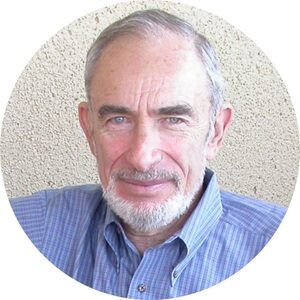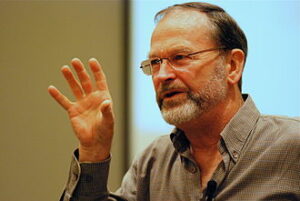Avoiding A Ghastly Future panel with Paul Ehrlich, Bill Rees and Nate Hagens. But first, American neurosurgeon Ann-Christine Duhaime: “Minding the Climate – How Neuroscience Can Help Solve Our Environmental Crisis.”
Listen to or download this Radio Ecoshock show in CD Quality (57 MB) or Lo-Fi (14 MB)
==================================================
IS THE BRAIN A BARRIER TO SOLVING THE CLIMATE CRISIS?
ANN-CHRISTINE DUHAIME
We humans had the same brain for at least 100,000 years, but only developed technology in the last 2,000 years. Is that brain equipped to deal with rapid climate change? Let’s ask someone who knows what is inside your head.
Ann-Christine Duhaime is a medical doctor. She is former Director of Pediatric Neurosurgery at the Massachusetts General Hospital and Distinguished Professor of Neurosurgery at Harvard Medical School. She is Associate Editor-in-Chief for The Journal of Climate Change and Health. Then Ann-Christine wondered: “What can I contribute to understanding climate change?” The result is her new book “Minding the Climate – How Neuroscience Can Help Solve Our Environmental Crisis.”

We face a terrible threat of our own making in climate change. But so far, we continue to make it worse with more emissions and more destruction of nature. People call that a political problem, economic, or psychiatric maybe. Is it possible we have a brain barrier that limits our ability to act?
Until I read this book “Minding the Climate”, I did not know American health care is responsible for about 8 percent of the nation’s greenhouse gas emissions. Ann-Christine tells us about her Green Hospital project for children.
Faced with developing climate disaster, some scientists call for geoengineering the Earth, like spraying aerosols to reflect more sunlight. The efficacy and side-effects are unknown until we try them. Will someone try to geoengineer the human mind, to initiate changes at the brain level, like a climate drug or a survival implant?
Duhaime says there is no need for any of that. The human brain is very “plastic”. As we know from people recovering from strokes, the brain can rewire itself to regain lost functions. We have enough brain power, if properly used, to solve our crisis without implants or any fantastical technology. She finds: the brain’s “decision-making apparatus … is heavily influenced by its evolutionary design, but is also exquisitely flexible. we are less ‘hard-wired’ than ’predisposed...’”
Plus we already have abandoned neural implants. The Argus optical implants cost $150,000 to restore sight, but then the company went bust. The journal Nature just published an article this month: “Abandoned: the human cost of neurotechnology failure“.
Also when we consider neuroscience, can we avoid Elon Musk’s brain chips? And can we avoid the possibility of an Elon designing in HIS view of the social game, rather than what most of humanity wants?
Here we are on a radio program interviewing experts, hoping to change a few minds. But Duhaime writes: “While generally we can adapt and learn new responses, it’s harder for us to change our habits when it’s not because our circumstances have changed, but just because we receive new information.” That is a serious problem. Vital climate information tells us we must change to avoid disaster. But the circumstances of living have not changed enough to demand that. Just knowing the truth isn’t enough for the brains we have to act.
How can people losing their homes and communities to unheard-of fires during raging heat, or extreme rainfall events, still denounce climate change as a scam, even angrily? Why does the brain insist on unreality? Does that denial serve an evolutionary function, as our guest Ajit Varki suggested? Varki is a Professor of Medicine and pioneer researcher, from the University of California in San Diego.
Ann-Christine described circuits that help “dampen your perception of things that aren’t changing or important,..[otherwise] you’d continuously feel every tag and fold in your clothing, all day long.”
The problem: after bombardment of “news” we develop a “damping circuit” when it does not change, or immediately affect us. We heard about climate change, but still have the same house and job. With all kinds of threat around us, from the triple pandemic to inflation, does the brain just turn off the news? How can we maintain focus on a problem that may not hurt us badly in the developed world for another decade?
ADDICTION TO FOSSIL FUELS
“The drug itself gets less rewarding, but going without the drug feels worse and worse.” The drug user may sell their house or their bodies to get the next hit of drugs, even though they no longer get the intense high. They feel terror about getting “sick” in withdrawal. Is that how it is now for the privileged Western consumer, no longer enjoying their purchases, but terrified of what happens if they stop?
Then with addiction, even when the drug has stopped, all kind of associations in the environment remind and trigger a desire to use again. We could see that happening in any society that manages to renounce fossil fuels. Millions would still dream of the “good old days”, buy a banned gas car as a collector keep-sake, trying to sneak a whiff of fossil power. The desire for fossil power will not easily end even if we have the tools for energy transition….
PRESS COVERAGE IN NYT:
Train Your Brain
We know what we need to do for the climate, so why don’t we just do it? A neurosurgeon explains.
By Somini Sengupta, Nov. 29, 2022 (in the Climate Forward subscriber-only newsletter)
===================================================
AVOIDING A GHASTLY FUTURE: EHRLICH, REES & HAGEN
Why don’t humans act to save the climate? Following up on our guest neurosurgeon, we have a panel of excellent minds, as recorded March 2022. It features Paul Ehrlich, author of the population bomb and a dozen more books; UBC Professor Emeritus William (Bill) Rees; and the finance and energy guru Nate Hagens. All three have been guests on Radio Ecoshock. They discuss the paper “Underestimating the Challenges of Avoiding a Ghastly Future”. The recording is by the group Living Resilience, and the Poetry of Predicament Podcast.
The full presentation lasts an hour and a half. Here, we pull out key segments relating to our theme: mental barriers to action. Due to poor audio, I was unable to include the eminent Mexican scientist Gerardo Ceballos. That is a shame. In this presentation Ceballos warned:
“2050 will be too late for biodiversity – the next 14 years will define what is left of plants and animals on this planet, and it will effect us directly”.
Radio Ecoshock previously broadcast a feature interview with the lead author of the Ghastly Future paper, Professor Corey Bradshaw in Australia. In this program with this short talk by the famous Stanford biologist, Dr. Paul Ehrlich, on why the Ghastly Future paper was published, why these scientists had to pass on the bad news.
This panel was introduced by Stanley Wu, Coordinator for the Omega and Resilience Projects and hosted by Michael Lerner, Omega Founder. Dr. Joan Diamond was another panelist. In addition to being a paper author, Joan Diamond is Senior Advisor, Omega Executive Director, MAHB and Fan Initiative. She talks about the failure of the scientific community to convey the dire future ahead.
FIRST UP: DR. PAUL EHRLICH
Paul Ehrlich is the first speaker. He and coauthors were following up on James Hansen observation about scientific reticence to “tell it like it is”. Ehrlich says: “Most of my colleagues are scared with us about what is going on in the world.”

Talking about President Joe Biden’s 4 main goals announced on taking office, Ehrlich says the first three worthy challenges like the pandemic, a fragile economy, and endemic racism – will all become “moot” if civilization is destroyed by out-of-control climate change.
In his presentation, Paul refers to the book “Countdown” by Professor Shanna Swan about loss of fertility. She says we may have a zero sperm count in the population by 2050, given current trends.
REACTION TO THE PAPER BY DR. WILLIAM REES
Next we have a reaction to the Ghastly Future paper by Bill Rees, who was not an author. William Rees is Professor Emeritus at the University of British Columbia. He directed of the School of Community and Regional Planning there. Over the years, I recorded many of Bill’s speeches, always learning from his brilliance.

Bill begins by saying humans are not primarily a rational species. He cites late nineteenth century philosopher/scientist Gustav Le Bon. In Le Bon’s book “The Crowd: A Study of the Popular Mind” (easily downloaded from the Net) Le Bon says:
“The masses have never thirsted after truth. They turn aside from evidence that is not to their taste, preferring to Deify error, if error seduces them. Whoever can supply them with the illusions is easily their master. Whoever attempts to destroy their illusions is always their victim.”
Bill says “We have a predisposition to cover up those things that we find unpleasant.” He also cites Pulitzer Prize winning American historian Barbara Tuchman’s book “The March of Folly”.
THEY HAVE TO WANT TO CHANGE
An old joke: How many psychiatrists does it take to change a light-bulb? One, but the light-bulb has to want to change. One of Bill’s slide quotes could apply to my interview with neurosugeon Ann-Christine Duhaime. The Bill Rees slide says:
“During individual development, sensory experiences and cultural norms literally help shape the human brain’s synaptic circuitry in patterns that reflect and embed those experiences. Subsequently, people seek out ‘compatible’ experiences and, ‘when faced with information that does not agree with their [preformed] internal structures, they deny, discredit, reinterpret or forget that information.’”
This comes from a 2006 book “Brain and Culture” by Bruce E. Wexler. The subtitle is; “Neurobiology, Ideology, and Social Change”, an Bradford/ MIT book. Wexler is a neurobiologist and psychiatrist. Part II of that Wexler book is “The Neurology of Ideology” which includes a chapter on “Self-Preservation and the Difficulty of Change in Adulthood”. In his introduction, Wexler writes:
“Chapter 4 reviews evidence that once internal structures are established, they turn the relationship between internal and external around. Instead of the internal structures being shaped by he environment, the individual now acts to preserve established structures in the face of environmental challenges, and finds changes in structure difficult and painful.”
So adults organize to preserve the past, it’s institutions and patterns. Climate change with its revolutionary never-before-seen events, is exactly the wrong fit for this kind of brain. Change feels painful to the established synapses and so we resist it, at all costs apparently. Houston, we have a brain problem.
Society also sends the wrong message when education “ends” and life duties begin. That signal the brain, and perhaps agrees with biological timing, that more new things do not have to be learned. But now we need to keep learning life-long.
“THE POPULATION HAS BEEN SOCIALLY ENGINEERED TO IGNORE REALITY”
But Bill adds another layer: he says since the Reagan/Thatcher/Mulroney era, “the population has been socially engineered to ignore reality. We seek out the reassuring lie rather than the inconvenient truth.” We use ideology, religion, and denial to choose instead “magical thinking”. The Oxford Dictionary choose as their 2016 word of the year: “post-truth”. We are more responsive to emotional appeals than facts.
Rees uses the term “endarkenment” to describe this age of denial and magical thinking. While greenhouse gases continue to increase, we have seen 34 climate conferences meant to address it. None have. A half dozen international agreements have had “virtually no effect” on rising GHG’s.
The “Limits to Growth” report 50 years ago pointed to a collapse of the global economy around 2050. We are on that path, says Rees. He is not predicting that, but says the science is pointing in that direction.
SEE ALSO: This feature interview with Dr. Rees by The Poetry of Predicament podcast.
————————————————
ANOTHER RESPONSE TO THE GHASTLY FUTURE: DR. NATE HAGENS
Dr. Nate Hagens is not a scientist. He is trained in economy and was a senior figure in a Wall Street Firm, before going into independent energy analysis. Hagens appeared on in a full-show interview on Radio Ecoshock in January 2020. Now we get Nate’s quick piercing outline of our big picture situation, as recorded in 2022 by Living Resilience.
Nate Hagens covers three themes in 5 minutes: “ghastliness, metabolism and emergence, a brief choreography for response”
Nate begins with a lot of data and figures. He describes a sudden upward curve in energy employed by one organism, humans, in the last century. He calls it “the carbon pulse”. We are using hydrocarbons 10 million times faster than they were sequestered underground in past ages. One barrel of oil does the equivalent of four years of one person’s physical work.
The economy uses 100 billion barrels of fossil fuel equivalents every year, which equals works out to a labor equivalent of 500 billion human workers, relative to the four or five billion actual workers on this planet. The biomass of humans and our livestock outweigh the mass of wild mammals fifty to one.
“THERE IS NO ONE DRIVING THE BUS.”
Hagens says we are like an amoeba, a global energy-based growth – a super-organism. The metabolism of the human heat engine, plus the toxic waste stream. Nate says “no one is in charge of this system”. After working with high level U.S. politicians, Hagens concludes: “There is no one driving the bus.”
He thinks our CO2 is peaking in the next decade (partly due to decline fossil fuel sources). In fact he thinks global peak oil was in 2018. But when we run lower on fossil fuels, he wonders whether our other impacts on the environment, like toxic alternatives or forest destruction, will get worse. Trying to price carbon and all that is “like trying to argue with a forest fire”. Hagens doubts we will replace fossils with renewables or keep fossil energy in the ground. We will keep trying to grow, by any means, until we can’t.
As a society, we live in “islands of expertise separated by an ocean of nonsense.” “It’s a perfect storm for our evolved tribal minds to ignore or deny.” With his experience in the field of finance, Hagens thinks we are headed for “a financial recalibration”. He thinks sitting politicians can never act on this without a crisis. We will need a “species-level social contract” instead of national ones.
“We are not alive in normal times.” he concludes. He urges all who can hear this to devote some part of their professional and personal lives to “service to the future.”
What can we do? Nate offers three ideas:
1. change in tax system (not likely now, but could happen when we hit the great depression).
2. change goal, not growth or GDP, but happiness or some better human value
3. create a network of people now – a “shadow council” to plan and prepare when people are finally ready to act.
SEE ALSO: This recent interview with Nate Hagens and Simon Michaux, in The Great Simplification.
MORE NUGGETS FROM THE Q & A
We have only time for a few selections from the long question and answer segment, starting with Paul Ehrlich. Paul seconds Bill about the role of emotion getting things done. Ehrlich tells us about his argument with famous climate campaigner Al Gore about that. Quoting Joan Diamond, Ehrlich concludes: “There are no solutions but there are responses”.
“Do we need a new religion?” Paul asks, to get the social cohesion to keep a natural world? He talks about a movement by the big corporations to rule the world with artificial intelligence. We need a third revolution. We had the agricultural and industrial revolutions. We need another on that scale to change things enough to let civilization survive Ehrlich says..
We wrap this whirlwind selection from the Ghastly Future panel, with a bit more from Dr. Bill Rees. Rees talks about the explosion of human numbers and impacts, in 200 years. This is not “normal” but totally anomalous related to our history. Again, we channeled everything into the human system, including all other life forms. “Our political thinking is in fundamental conflict with the laws of nature.” Rees says.
He explains power is held by the corporate sector that has a vested interest in growth. They can capture the regulators, fund politicians, fund academia, and own the media. We need scientists to speak to power.
You just heard selections from a Poetry of Predicament Podcast, discussing the mind-blowing paper called “Underestimating the Challenges of Avoiding a Ghastly Future”. The full YouTube video is here.
Find more hard talk from Bill Rees here in the un-Denial blog.
By Bill Rees: On the Virtues of Self-Delusion—or maybe not!
=======================
My special thanks to those who sent a special Christmas gift of support for Radio Ecoshock. You help keep this whole mission going.
Next week I’m off, but you can hear some good green songs in my holiday show before the New Year arrives. I’m Alex Smith. Thank you for listening, and caring about our world.
You ought to interview John Gowdy about his recent book ‘Ultrasocial: The Evolution of Human Nature and the Quest for a Sustainable Future’ which touches on many aspects of the issues discussed here.
Thank you! I will look into John Gowdy.
The teachings in ‘How to Understand the Mind’ by Geshe Kelsang Gyatso are priceless; not just to understand precisely the different levels of human mind and exactly how they function, but HOW to actually develop and maintain the minds we wish for!. We cannot change others – but understanding our own mind and working assiduously on it leads to increased goodness, wise intentions, mental peace, and seems therefore wiser, peaceful decision making.